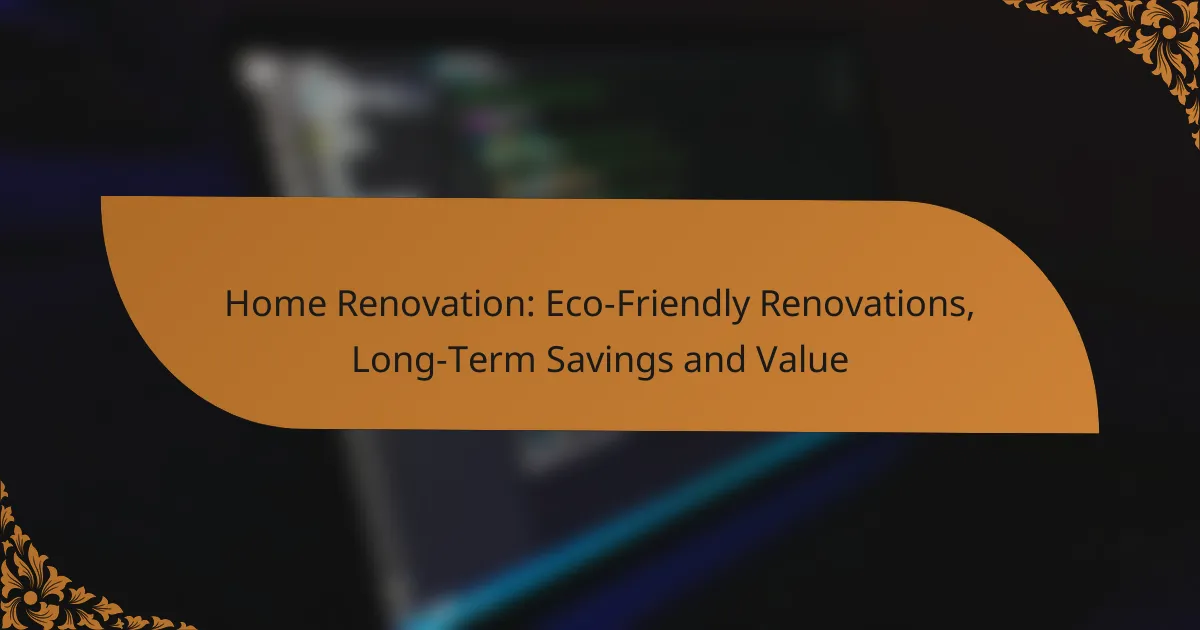Home renovations that prioritize eco-friendliness not only contribute to a healthier planet but also offer significant long-term savings for homeowners. By incorporating sustainable materials and energy-efficient technologies, these upgrades can enhance property value while reducing utility costs. Investing in eco-friendly solutions is a smart choice for those looking to improve their living space and make a positive impact on the environment.
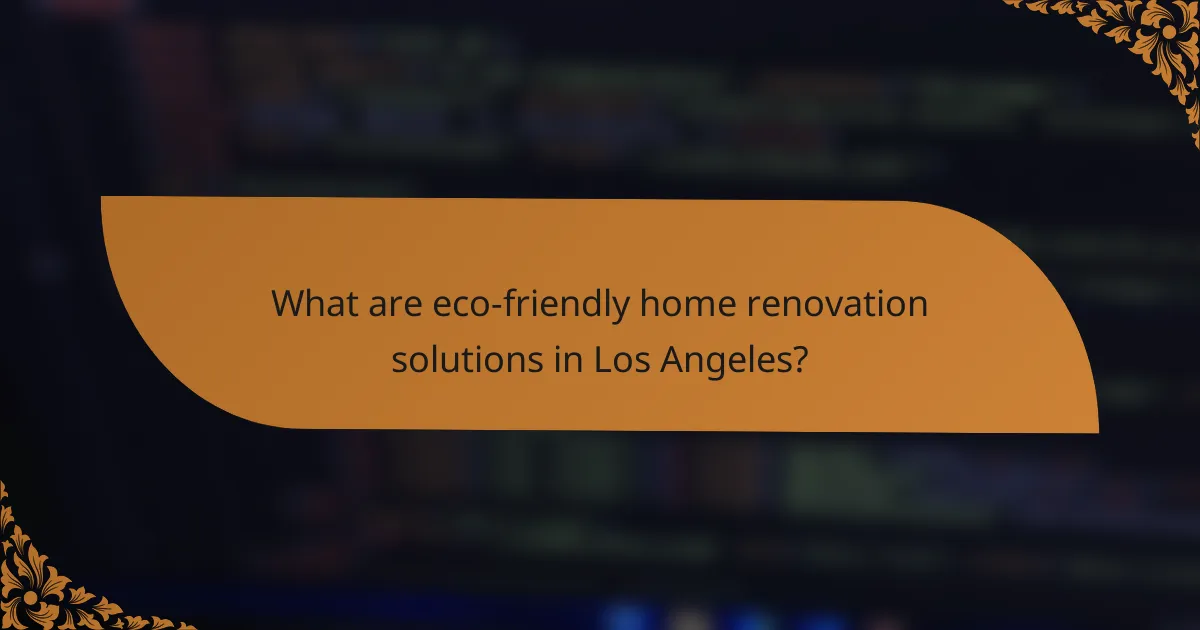
What are eco-friendly home renovation solutions in Los Angeles?
Eco-friendly home renovation solutions in Los Angeles focus on sustainability and energy efficiency, helping homeowners reduce their environmental impact while saving on utility costs. These renovations often enhance property value and appeal, making them a smart investment for the future.
Solar panel installation
Installing solar panels is one of the most effective eco-friendly renovations. By converting sunlight into electricity, homeowners can significantly reduce their energy bills and reliance on fossil fuels. In Los Angeles, where sunlight is abundant, solar panel systems can pay for themselves within a few years through savings and potential tax incentives.
When considering solar panel installation, evaluate your roof’s orientation, shading, and size. It’s also essential to choose a reputable installer and explore financing options, such as solar loans or leasing agreements, to make the investment more manageable.
Energy-efficient windows
Energy-efficient windows help maintain indoor temperatures, reducing heating and cooling costs. In Los Angeles, selecting double or triple-glazed windows with low-emissivity (Low-E) coatings can minimize heat transfer and UV exposure, enhancing comfort and protecting furnishings.
When upgrading windows, consider the frame materials, such as vinyl or fiberglass, which offer better insulation than traditional wood. Look for windows that meet ENERGY STAR standards to ensure optimal efficiency and potential rebates.
Recycled materials usage
Using recycled materials in renovations can significantly lower environmental impact. In Los Angeles, options include reclaimed wood for flooring or cabinetry, recycled metal for roofing, and repurposed bricks for landscaping. These materials not only reduce waste but also add unique character to homes.
When sourcing recycled materials, check local suppliers or salvage yards. Ensure that the materials meet safety standards and are suitable for your specific renovation needs.
Green roofing options
Green roofing involves installing vegetation on rooftops, providing insulation and reducing stormwater runoff. In Los Angeles, green roofs can help mitigate the urban heat island effect while enhancing biodiversity and air quality.
Consider the structural integrity of your home before installing a green roof, as it requires additional weight support. Choose native plants that thrive in the local climate to minimize maintenance and water usage.
Low-VOC paint choices
Low-VOC (volatile organic compounds) paints are essential for maintaining indoor air quality during renovations. These paints emit fewer harmful chemicals, making them safer for occupants and the environment. In Los Angeles, many brands offer a variety of colors and finishes that comply with strict air quality regulations.
When selecting low-VOC paints, look for certifications such as Green Seal or the EPA’s Safer Choice label. Always ensure proper ventilation during application to further reduce indoor air pollutants.
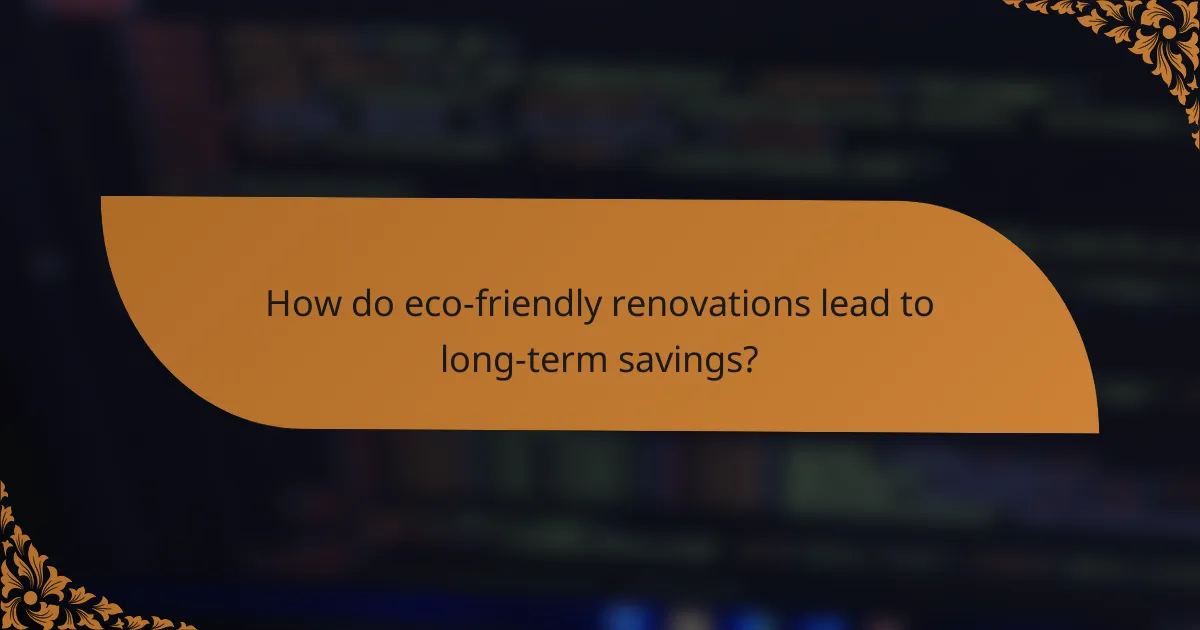
How do eco-friendly renovations lead to long-term savings?
Eco-friendly renovations can significantly reduce long-term costs by enhancing energy efficiency, lowering maintenance needs, and increasing property value. By investing in sustainable materials and technologies, homeowners can enjoy substantial savings over time.
Reduced energy bills
Eco-friendly renovations often include energy-efficient appliances, improved insulation, and renewable energy sources like solar panels. These upgrades can lower energy consumption, leading to reduced monthly utility bills. Homeowners might see savings of 20-50% on their energy costs depending on the extent of the renovations.
To maximize savings, consider installing Energy Star-rated appliances and LED lighting, which consume less power. Additionally, sealing drafts and upgrading windows can further enhance energy efficiency, contributing to lower heating and cooling expenses.
Lower maintenance costs
Renovations that focus on sustainable materials often result in lower maintenance costs over time. For example, using durable, weather-resistant materials can reduce the frequency and cost of repairs. Homeowners may find that eco-friendly roofing or siding requires less upkeep compared to traditional options.
Choosing low-maintenance landscaping, such as native plants, can also save on water and maintenance expenses. Regular maintenance costs can be reduced by 10-30% with these thoughtful choices, allowing homeowners to allocate funds to other areas.
Increased property value
Eco-friendly renovations can enhance a property’s market value, making it more attractive to potential buyers. Homes with energy-efficient features often sell for a premium, as buyers are increasingly looking for sustainable living options. Studies suggest that properties with green certifications can command prices 5-15% higher than comparable homes without such features.
Investing in eco-friendly upgrades not only benefits current homeowners through savings but also positions the property favorably in the real estate market. Consider obtaining certifications like LEED or Energy Star to further boost appeal and value when selling.
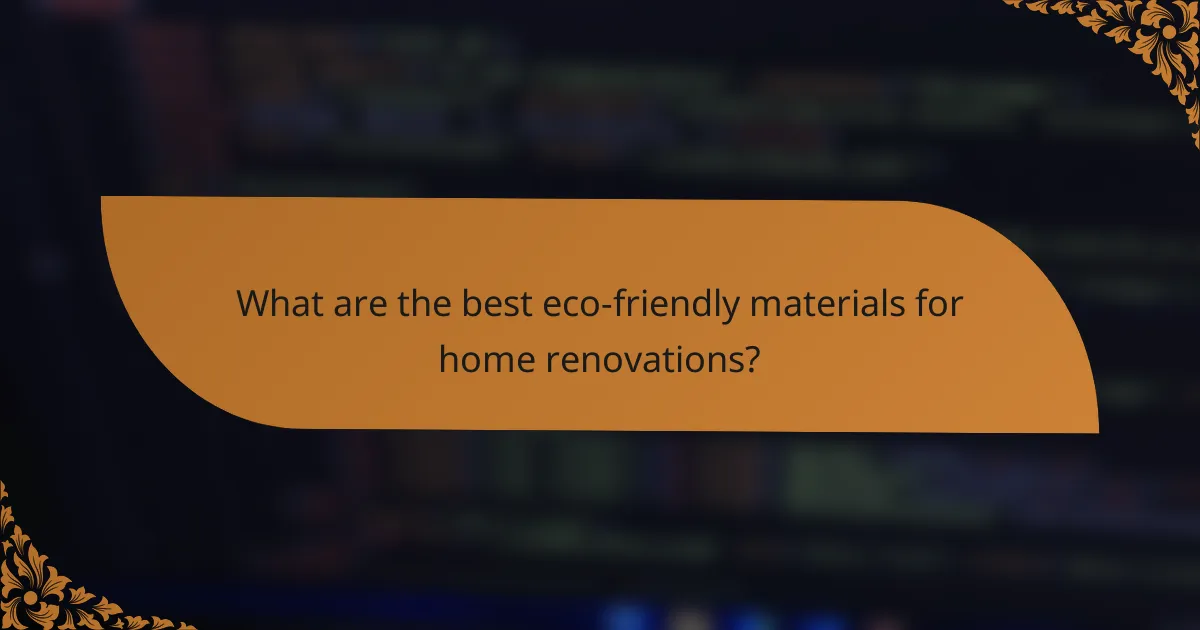
What are the best eco-friendly materials for home renovations?
The best eco-friendly materials for home renovations include bamboo flooring, reclaimed wood, and recycled glass countertops. These materials not only reduce environmental impact but also enhance the aesthetic and value of your home.
Bamboo flooring
Bamboo flooring is a sustainable alternative to traditional hardwood, as bamboo grows rapidly and can be harvested without killing the plant. It offers durability and a unique look, making it suitable for various interior styles.
When considering bamboo flooring, look for products that are certified by organizations like the Forest Stewardship Council (FSC) to ensure responsible sourcing. Prices typically range from $2 to $7 per square foot, depending on quality and finish.
Reclaimed wood
Reclaimed wood is sourced from old buildings, barns, and other structures, giving new life to materials that would otherwise be discarded. This option not only reduces waste but also adds character and history to your renovation.
When using reclaimed wood, inspect it for quality and potential contaminants. Prices can vary widely, often between $3 and $15 per square foot, depending on the wood type and processing required.
Recycled glass countertops
Recycled glass countertops are made from post-consumer glass, providing a stunning and eco-friendly surface for kitchens and bathrooms. These countertops are available in various colors and styles, allowing for creative design options.
Consider the maintenance requirements, as some recycled glass surfaces may need sealing to prevent staining. Costs typically range from $50 to $150 per square foot, making them a stylish yet potentially pricier choice for your renovation.
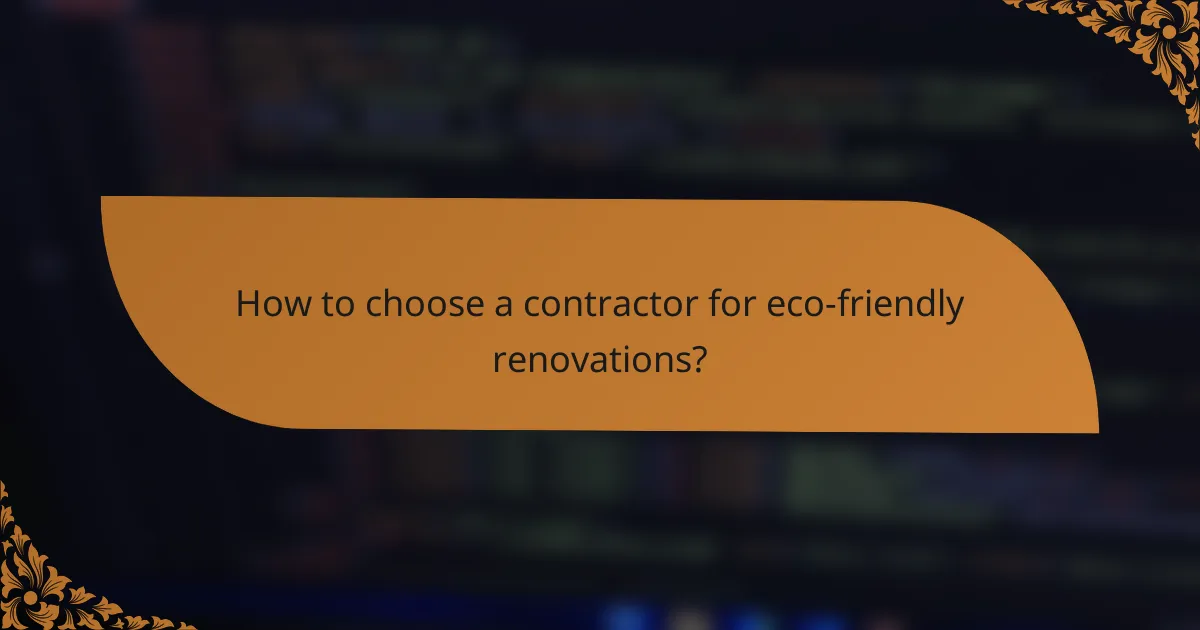
How to choose a contractor for eco-friendly renovations?
Choosing a contractor for eco-friendly renovations involves assessing their qualifications, experience, and past project success in sustainable building practices. Prioritize contractors who are knowledgeable about green materials and energy-efficient solutions to ensure your renovation aligns with eco-friendly goals.
Check certifications and experience
Start by verifying the contractor’s certifications in sustainable building practices, such as LEED (Leadership in Energy and Environmental Design) or similar local certifications. These credentials indicate a commitment to eco-friendly methods and knowledge of current regulations.
Experience is equally important; look for contractors with several years in the field, particularly those who have worked on projects similar to yours. A seasoned contractor will be familiar with the challenges of eco-friendly renovations and can provide effective solutions.
Review past eco-friendly projects
Request a portfolio of the contractor’s previous eco-friendly projects. This will give you insight into their style, quality of work, and ability to meet sustainability standards. Look for projects that showcase energy-efficient designs, use of recycled materials, and innovative water-saving solutions.
Additionally, consider reaching out to past clients for testimonials. Ask about their experiences regarding the contractor’s reliability, communication, and adherence to eco-friendly practices. Positive feedback from previous clients can significantly influence your decision-making process.

What are the benefits of green building certifications?
Green building certifications offer numerous advantages, including enhanced sustainability, improved energy efficiency, and increased property value. These certifications signify that a building meets specific environmental standards, which can lead to long-term savings and a positive impact on the environment.
Increased marketability
Buildings with green building certifications often attract more buyers and tenants due to their eco-friendly features. This increased marketability can translate into higher sale prices or rental rates, as environmentally conscious consumers are willing to pay a premium for sustainable living spaces.
For example, properties certified under the LEED (Leadership in Energy and Environmental Design) program are often viewed as more desirable, leading to quicker sales and reduced vacancy rates. This trend is particularly strong in urban areas where sustainability is a growing priority among residents.
Access to incentives and rebates
Many governments and local authorities offer financial incentives for buildings that achieve green certifications. These can include tax credits, grants, and rebates that significantly reduce the upfront costs of eco-friendly renovations.
For instance, in the United States, homeowners may qualify for federal tax credits for energy-efficient upgrades, while some states provide additional rebates for solar panel installations or energy-efficient appliances. It’s crucial to research local programs to maximize potential savings.
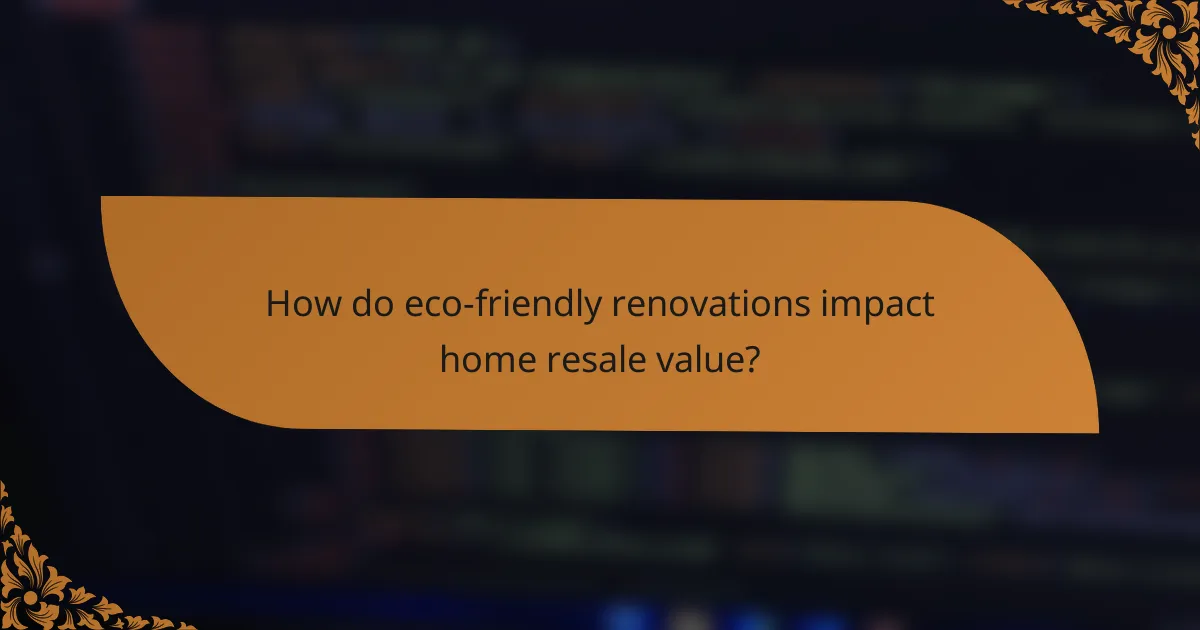
How do eco-friendly renovations impact home resale value?
Eco-friendly renovations can significantly enhance a home’s resale value by attracting environmentally conscious buyers and reducing long-term utility costs. Properties that feature energy-efficient systems, sustainable materials, and green certifications often command higher prices in the market.
Benefits of eco-friendly renovations
Eco-friendly renovations offer numerous advantages, including lower energy bills and improved indoor air quality. Homeowners can save on utility costs by installing energy-efficient appliances and insulation, which can lead to savings of 20-30% on monthly bills.
Additionally, sustainable materials such as bamboo flooring or recycled countertops can enhance the aesthetic appeal of a home while being environmentally responsible. Buyers increasingly prioritize homes that reflect their values, making eco-friendly features a strong selling point.
Market trends and buyer preferences
Current market trends indicate a growing preference for eco-friendly homes. Many buyers are willing to pay a premium for properties that are energy-efficient or have green certifications like LEED or Energy Star. This trend is particularly strong among millennials and Gen Z, who prioritize sustainability.
In some regions, homes with eco-friendly features can sell for 5-15% more than comparable homes without these upgrades. Understanding local buyer preferences can help homeowners make informed renovation decisions that align with market demands.
Cost considerations and return on investment
While eco-friendly renovations can require a higher initial investment, they often yield a favorable return on investment (ROI). For instance, energy-efficient windows and solar panels can recoup a significant portion of their costs through energy savings and increased home value.
Homeowners should carefully evaluate which eco-friendly upgrades offer the best ROI in their area. Consulting with local real estate agents can provide insights into which features are most sought after and how they impact resale value.
